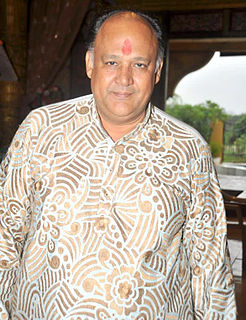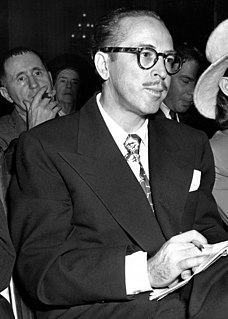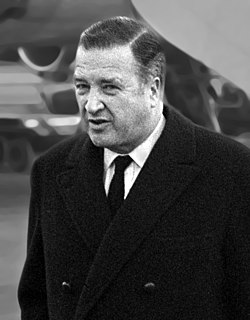Цитата Алока Натха
Что вы подразумеваете под свободой слова? Демократия не означает, что вы оскорбляете свою страну. Подстрекательство к мятежу имеет закон в конституции. Нельзя выступать с речами против своей страны.
Связанные цитаты
Первая и Четырнадцатая поправки гласят, что Конгресс и штаты не должны издавать «никаких законов», ограничивающих свободу слова или печати. Чтобы санкционировать систему цензуры, я должен был бы сказать, что «отсутствие закона» не означает того, что оно говорит, что «отсутствие закона» квалифицировано как означающее «некоторые» законы. Я не могу сделать этот шаг.
Потом была эта свобода, за которую всегда убивали маленьких парней. Была ли это свобода от другой страны? Свобода от работы, болезни или смерти? Свобода от свекрови? Пожалуйста, мистер, дайте нам купчую на эту свободу, прежде чем мы пойдем и будем убиты. Дайте нам купчую, составленную прямо заранее, за что нас убивают... чтобы мы могли быть уверены, что после победы в вашей войне у нас будет та же свобода, о которой мы договорились.
В этой стране существует большая путаница в отношении того, что мы хотим, а что нам нужно, - сказал Морри. - Вам нужна еда, вы хотите шоколадное мороженое. Вы должны быть честны с собой. Вам не нужна новейшая спортивная машина, вам не нужен самый большой дом. Правда в том, что вы не получаете удовлетворения от этих вещей. Знаешь, что на самом деле приносит тебе удовлетворение?... Предлагая другим то, что ты должен дать... Я не имею в виду деньги, Митч. Я имею в виду ваше время. Ваша забота. Ваше повествование. Это не так сложно.
Я бы никогда не хотел принять закон, ограничивающий свободу слова, но это не значит, что мы должны мириться с заявлениями, подрывающими основы национального единства и уважения. Представьте, что вас просят защитить страну, некоторые граждане которой говорят, что человек в Белом доме не является их президентом. Или главный кандидат в президенты обвиняет главнокомандующего даже в том, что он не является гражданином США. Такого рода заявления подрывают доверие к нашей демократии, и обе стороны должны публично отвергать их. Мы должны восстановить уверенность в том, что мы нация, которая любит и верит в себя.
Держитесь, друзья мои, за Конституцию вашей страны и созданное в соответствии с ней правительство. Оставьте зло, которое существует в некоторых частях страны, но которое находится вне вашего контроля, на мудрое руководство всемогущего Провидения. Выполняйте те обязанности, которые присутствуют, простые и позитивные. Уважайте законы своей страны.
Формулировка Первой поправки не оставляет места для вывода о том, что сокращения речи и прессы могут быть сделаны только потому, что они незначительны. Эта поправка простыми словами предусматривает, что «Конгресс не должен издавать законов... ограничивающих свободу слова или печати». Я читал, что "нет закона... сокращения" означает отсутствие сокращения закона.
Два Совета. . . разговаривали друг с другом. И один из них спросил: «Какая разница между Конституцией СССР и Конституцией Соединенных Штатов?» А другой сказал: «Это просто. Советская Конституция гарантирует свободу слова и свободу собраний. Американская Конституция гарантирует свободу после слова и свободу после собраний».
Относительная свобода, которой мы пользуемся, зависит от общественного мнения. Закон не защищает. Правительства издают законы, но исполняются ли они и как ведет себя полиция, зависит от общего настроения в стране. Если большое количество людей заинтересовано в свободе слова, свобода слова будет, даже если закон запрещает ее; если общественное мнение вялое, неудобные меньшинства будут преследоваться, даже если существуют законы, защищающие их.




































